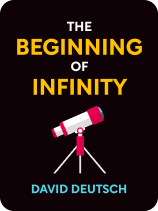

This article is an excerpt from the Shortform book guide to "The Beginning of Infinity" by David Deutsch. Shortform has the world's best summaries and analyses of books you should be reading.
Like this article? Sign up for a free trial here .
Where does knowledge come from? Why does Deutsch believe knowledge comes from guessing?
The book The Beginning of Infinity says that knowledge is infinite and people are responsible for finding it. But there are still different theories on how we gain such knowledge.
Below we’ll go through the different theories on where knowledge comes from and why we should stay open-minded about knowledge.
Different Schools of Thought
Where does knowledge come from? There are a few theories: empiricism, positivism, and Deutsch’s own theory.
Empiricism is the belief that all knowledge comes from observation and extrapolation. A related philosophy, Positivism, says that the only true knowledge is scientific knowledge, and all scientific knowledge can be proven or verified through experimentation. In other words, Positivism argues that knowledge doesn’t have to originate with experience, but it must be confirmed by it.
Deutsch rejects both of these philosophies. He says that it’s impossible to gain true knowledge just from observation, because we also have to interpret whatever we observe. In Deutsch’s definition, “true” knowledge is free from subjectivity, but observation is run through the filter of our past experiences, beliefs, and assumptions. Therefore, observation is not a reliable way to learn new information.
Instead, Deutsch argues that knowledge comes from conjecture and testing—in other words, we come up with new ideas based on what we already know, then experiment to see if those ideas hold up under scrutiny. Note that this differs from Positivism because much of what we know can’t be directly observed or experienced. For example, people believed that the sun rotated around the Earth based on what they saw and felt: The Earth seemed to be holding still while the sun, stars, and other planets moved around it. However, careful observations and mathematical calculations eventually proved that theory wrong.
Everything We Know Could Be Wrong
Several times throughout The Beginning of Infinity, Deutsch warns against what he calls parochialism: That is, mistaking one’s own experiences for universal truth. Parochial refers to a church parish, but in more general terms it means having a narrow or shortsighted outlook. Deutsch uses it to evoke the image of a priest dictating “truth” to his congregation—the exact opposite of the endless search for knowledge that Deutsch wants. (Shortform note: The opposite can also be true: the “Argument from Incredulity” is a logical fallacy in which a person dismisses an idea as crazy or illogical because it contradicts their own experiences or belief system.)
The author urges us to remember that science can’t prove something is true; instead, it disproves what is false. In other words, we gain new knowledge by correcting our mistakes. He calls this fallibilism: remembering that there’s no such thing as perfect knowledge and that nobody should be considered the absolute authority on any subject. Deutsch humorously suggests that we replace the word theory with misconception (as in, “the misconception of gravity”) to make the point that theories will never be completely right; they can only become less wrong.
In short, there’s always the chance that what we “know” could be proven wrong. Even something as fundamental as the theory of gravity could still be disproven if a scientist could demonstrate a phenomenon science can’t explain; say, a rock falling sideways instead of toward the earth. So far, nobody has managed to disprove gravity, but it’s still possible that someone could.
On a related note, Deutsche defines a “good” or “bad” explanation of a phenomenon based on how hard it would be to change the details of that explanation without destroying it. To continue with the theory of gravity, it would be very hard to change the details—that mass attracts mass with a particular amount of force—without making the whole explanation useless. If we proposed instead that mass repels mass, or we changed the theorized amount of force, then the theory would no longer explain what we observe in the universe. Therefore, gravity is a good explanation of those phenomena.
People Create Knowledge
One of Deutsch’s main problems with empiricism—the idea that we acquire knowledge through experience—is that it implies we’re essentially blank slates waiting for the universe to imprint knowledge on us through our experiences. In contrast, Deutsch believes that the ability to actively create knowledge through reasoning, extrapolation, and experimentation is what makes us people.
Similar to the “blank slate” belief, some people think the entire world was created for our benefit; in other words, all life on Earth exists simply to support humanity. Deutsch rejects this idea as well, saying we support ourselves by creating knowledge. In other words, people create knowledge to solve problems—ranging from how to support an ever-growing population to how we can explore other planets.

———End of Preview———
Like what you just read? Read the rest of the world's best book summary and analysis of David Deutsch's "The Beginning of Infinity" at Shortform .
Here's what you'll find in our full The Beginning of Infinity summary :
- That there is an infinite amount of knowledge in the universe
- Why humanity must never stop learning
- How new knowledge changes civilization for the better






